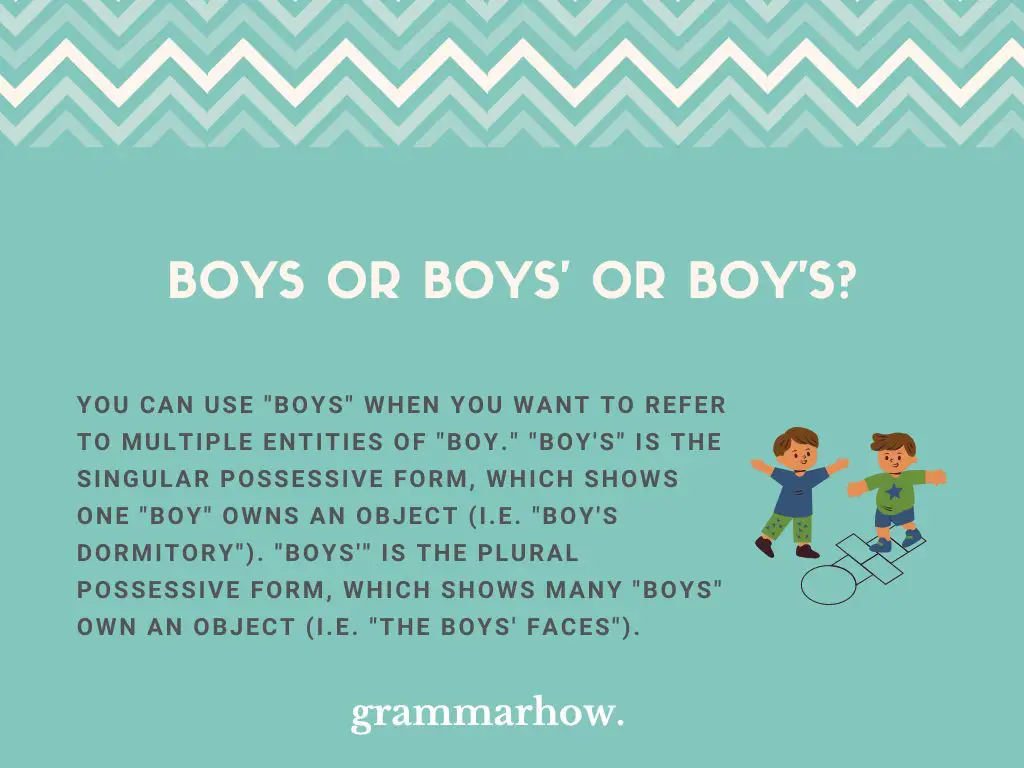“Boys,” “boys’,” and “boy’s” all appear in English. While “boy” is the root word, none of these forms is used in the same context.
This article will explore the singular, plural, and possessive forms when using the noun “boy.”
Boys or Boys’ or Boy’s?
You can use “boys” when you want to refer to multiple entities of “Boy.” “Boy’s” is the singular possessive form, which shows one “boy” owns an object (i.e. “boy’s dormitory”). “Boys'” is the plural possessive form, which shows many “boys” own an object (i.e. “the boys’ faces”).

Here is a quick reference to guide you through the appropriate forms:
| Singular | Boy |
| Plural | Boys |
| Singular possessive | Boy’s |
| Plural possessive | Boys’ |
Luckily, “boy” is a regular noun. It follows standard possessive rules when used in most written cases.
You should add an “‘s” to the end of “boy” with the singular possessive form. This means that one “boy” will own an object when “boy’s” is used.
You only need an apostrophe at the end of “boys” when multiple boys own an object. Since “boys” ends with an “s,” there’s no reason to include a second “s” after the apostrophe.
Boy’s
“Boy’s” refers to a single “boy” owning an object because it is the singular possessive form. You should use it when only one “boy” owns an object. He may also own multiple objects.
This is the simpler possessive form of the two. The singular possessive form tends to come up more often for most regular nouns, making it more likely for you to need it.
- Have you seen the boy’s basketball skills? He’s quite remarkable if you ask me.
- The boy’s clothes don’t fit him anymore. We really should invest in some new ones.
Boys’
“Boys'” is a possessive form. It is the plural possessive form, meaning that multiple “Boys” own the same object or group of objects in a sentence. It’s very common for the object owned by “boys'” to be in the plural form as well.
Typically, an owned object comes right after the possessive form. You might see “the boys’ school,” where “school” is the owned object.
- The boys’ school clubs won’t stay afloat now. We need to do something here.
- Boys’ soccer clubs are the way to go. We need to invest in them now while people are still interested.
Boys
“Boys” is plural. It’s the simplest form used here, as no possession is involved when referring to a plural entity. Instead, you should use it to show that more than one “boy” is present in your context.
You cannot show ownership when “Boys” comes up in your writing. It is only correct as the plural form because there is no apostrophe.
- I want the boys to know that I care about them. Would you call them in for me, please?
- There were thirteen boys in that class. We didn’t have enough to continue it.
Conclusion
“Boy” is singular. When you add an apostrophe and an “s” to the end of it, it becomes the singular possessive form. “Boy’s” shows that one “boy” owns an object.
“Boys” works as the plural. You can include an apostrophe after “boys” to turn it into the plural possessive form. “Boys'” shows that multiple “boys” own an object.

Martin holds a Master’s degree in Finance and International Business. He has six years of experience in professional communication with clients, executives, and colleagues. Furthermore, he has teaching experience from Aarhus University. Martin has been featured as an expert in communication and teaching on Forbes and Shopify. Read more about Martin here.
